 Peach farmer and customer. Peach farmer and customer. Imagine someone picks up a box of fruit at your fruit stand and instead of paying for it, assures you that your peaches will get great exposure. Imagine a customer at your restaurant sends back the bill. He doesn’t think he should pay for the time it took the chef to make the whole pot of paella, just the three minutes it took to scoop out his portion and bring it to the table. Imagine you clean houses for a living. A client calls and says she’s throwing a party and would love to have you come get the house ready. She can only afford to pay your bus fare, but she knows the guests will really appreciate your efforts. As a writer, these are the kinds of offers I get all the time. Many of them come from embattled college professors trying to wrestle some resource for their students out of shrinking budgets. They don’t understand why a poet should get paid several thousand dollars to come read her work and speak with students. It’s not like we’re teaching the whole course. They think the fee is for the hour in the auditorium, the ninety minutes in the classroom. They don’t know that the time we spend in front of people is the tip of a very big unpaid iceberg.  I once calculated the hourly wage I earned for writing my first book. The number grows over time, as royalties or permissions fees are added to the total, but five years out, it came to 2¢. When I charge a university $3000 to read, talk and answer questions for a few hours, I’m not just billing them for bringing the plate to the table. I spent years cooking up that paella. 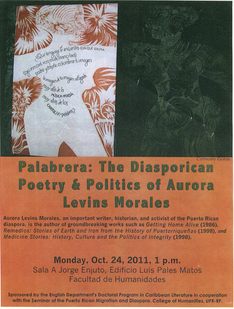 As a writer, my income comes from four main sources. Royalties, direct books sales at events, reprint permission fees, and fees to read or speak about my work—oh yeah, and once I had a paid writing residency. The most I’ve ever made in royalties in a year was around $2500. I don’t do many events, so direct books sales never amount to more than a few hundred bucks. Permissions fees have netted me as much as three or four thousand in a good year. Speaking engagements are the only time I make real money from my work. For writers, a living wage has to be calculated from the sum of all these income streams, divided by the time we spend. Let's just say it doesn't add up to the minimum wage, let alone a living one. 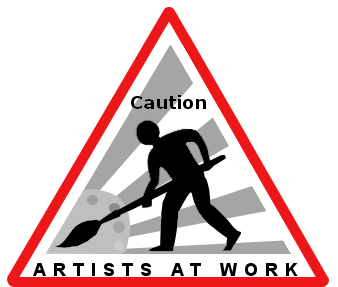 The lack of funding for the arts requires artists to spend a lot of our time either hustling for dozens of different tiny pots of money, engaging in massive marketing, or doing non-art jobs to pay for the few hours we can dedicate to our real work. Some are able to subsidize making art by teaching or administering it, but many of us don’t have that option. In a society that devalues art overall, and measures success in terms of sales and celebrity, not impact, the serious working artist is almost always grossly underpaid. I know my books have impact because people tell me so, often with great passion. They lend my books to friends, photocopy chapters for study groups, post excerpts online, and incorporate my words into posters, performances, even bathroom graffiti. All of that makes me happy, but it doesn’t earn me a cent.  Bob Marley having fun. Bob Marley having fun. There is a widespread belief, not always fully conscious, that making art is too much fun to be real work, that it’s somehow self-indulgent, that getting to do it at all is a privilege, and expecting to be paid, too, is kind of greedy. Educators do value the products of our work. They use our writing to teach all kinds of things that are more easily learned through art, write scholarly papers and popular articles about the significance of what we do, and exchange them through publications and at conferences. But the fact that their own lives are also filled with an endless hustle for time and money doesn’t always lead to a sense of solidarity with our struggles. 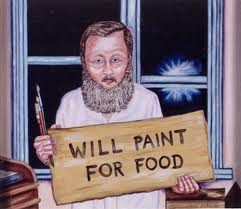 Sometimes it makes them see us as raw materials they’re trying to get the best possible deal on. Frustrated by the endless struggle to give their students more than the budget allows for, they may blame us for the unaffordability of their dreams and resent us for not accepting deeply discounted fees. Sometimes they lose track of the fact that if we don’t get paid enough to live on, we won’t be able to write the next poem, essay, novel. I have seven unfinished books sitting on my hard drive. When educators try to balance their inadequate budgets by underpaying artists, it’s shortsighted in a myriad of ways. It makes it harder for us to create the art they need in their classrooms, undermines solidarity among artists who are forced to scab on each other, bringing fees down for everyone, and damages the potentially powerful alliances we could be making. 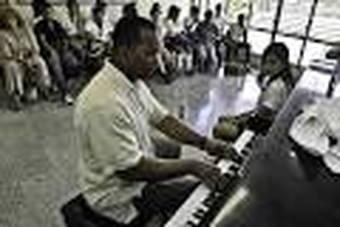 Escuela Nacional de Arte, Cuba Escuela Nacional de Arte, Cuba When the Cuban economy took a nosedive after the collapse of the Soviet Union, workers in many industries, including sugar production, suddenly didn’t have jobs. The Cuban government sent them back to school to learn new trades. They especially encouraged people to become artists or art teachers, because in their view, hard times require more art, not less. 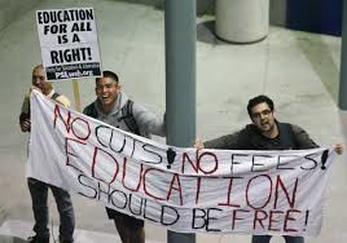 In the U.S., right wing attacks on education have tried to eliminate the arts, the humanities, in fact, to eliminate all learning for the sake of learning, for the sake of creating critical thinkers and cultured people, and tried to restrict schooling to the minimum necessary to produce workers and managers. Writers and teachers are on the same side in this struggle. We should be fighting together for the value of intellectual and artistic development for all people, and taking to the streets on behalf of poetry as a vital part of the quality education we really need in order to face the immense transformations of human society that have to happen for us to survive. 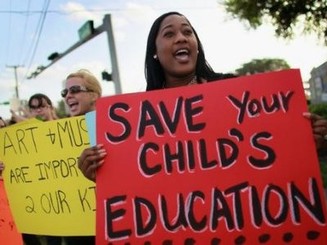 Teachers protest cuts to funding for school arts programs Photo by Joe Raedle/Getty Images Teachers protest cuts to funding for school arts programs Photo by Joe Raedle/Getty Images Chilean students have been a model of militant action for education. Refusing to accept diminishing resources and lessening quality, they have been marching in the streets, taking over buildings, running for public office, and demanding, with the support of trade unions and community organizations, that Chilean society support the growing of people. Teachers in the US have also fought powerfully against the closing of public schools, which is about the disposability of our children’s minds. Artists face similar battles as already limited funding for the arts vanishes, along with arts related jobs. And, of course, what funding there is generally prioritizes the conventional or meaninglessly experimental over the socially rooted and transformative. The assaults on the arts and on education are meant to restrict working and managerial class people to the narrowest possible spheres, so we will focus on increasing production of wealth for the wealthy. Artists and educators both fight to defend a dream of fulfilling, creative lives for all, for the expansion of human possibility, for learning to think and communicate in new ways, for the power of imagination. We’re on the front lines of this one together. We get pitted against each other by the grand theft of our collective wealth, artists against artists, educators against other educators, artists and educators against each other. (And of course many of us are both.) We need to find creative new strategies to fund our collaborations, stop fighting over spare change, and work together for real change. Teachers need artists to bring extra fire into their classrooms, to say the things they need someone else to say, to fight for them and for their students with our words and colors and rhythms, to use our outsider positions to shake things up in ways they don't have time or room to do, and there's nothing we love more. But since it's going to be a big, long battle, and writers and artists need to eat every day, we need teachers to get our backs. When we show up with our crates of peaches, don't ask us to give them away, even though it's been a bad year for budget cuts, and not enough fruit to go around. They're really good, 100% organic peaches that took a long time to grow. For all our sakes, make sure we get paid enough to go home and plant some more.
Comments are closed.
|
About Aurora
Aurora Levins Morales is a disabled and chronically ill, community supported writer, historian, artist and activist. It takes a village to keep her blogs coming. To become part of the village it takes, donate here. Never miss a post!
Click below to add this blog to your favorite RSS reader: Archives
September 2017
Categories
All
|
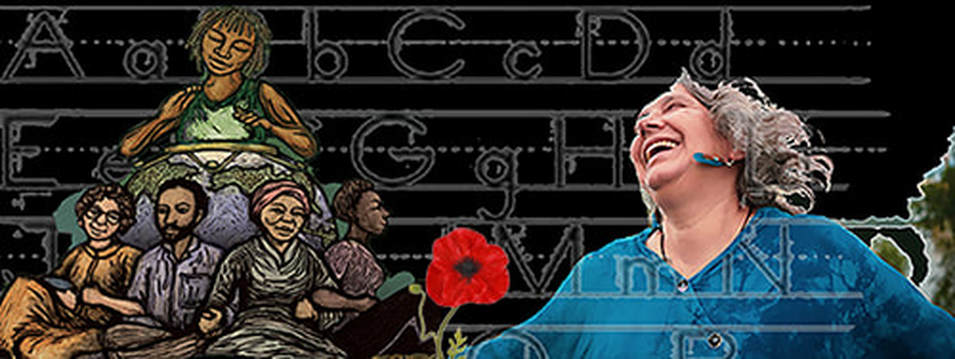
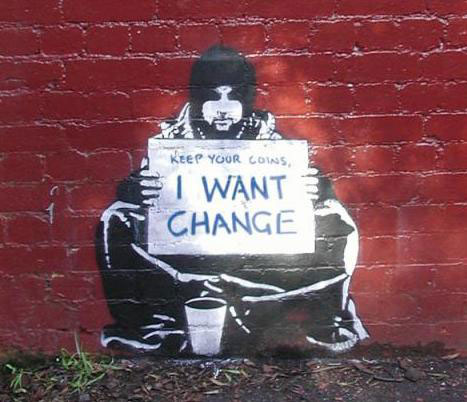

 RSS Feed
RSS Feed
